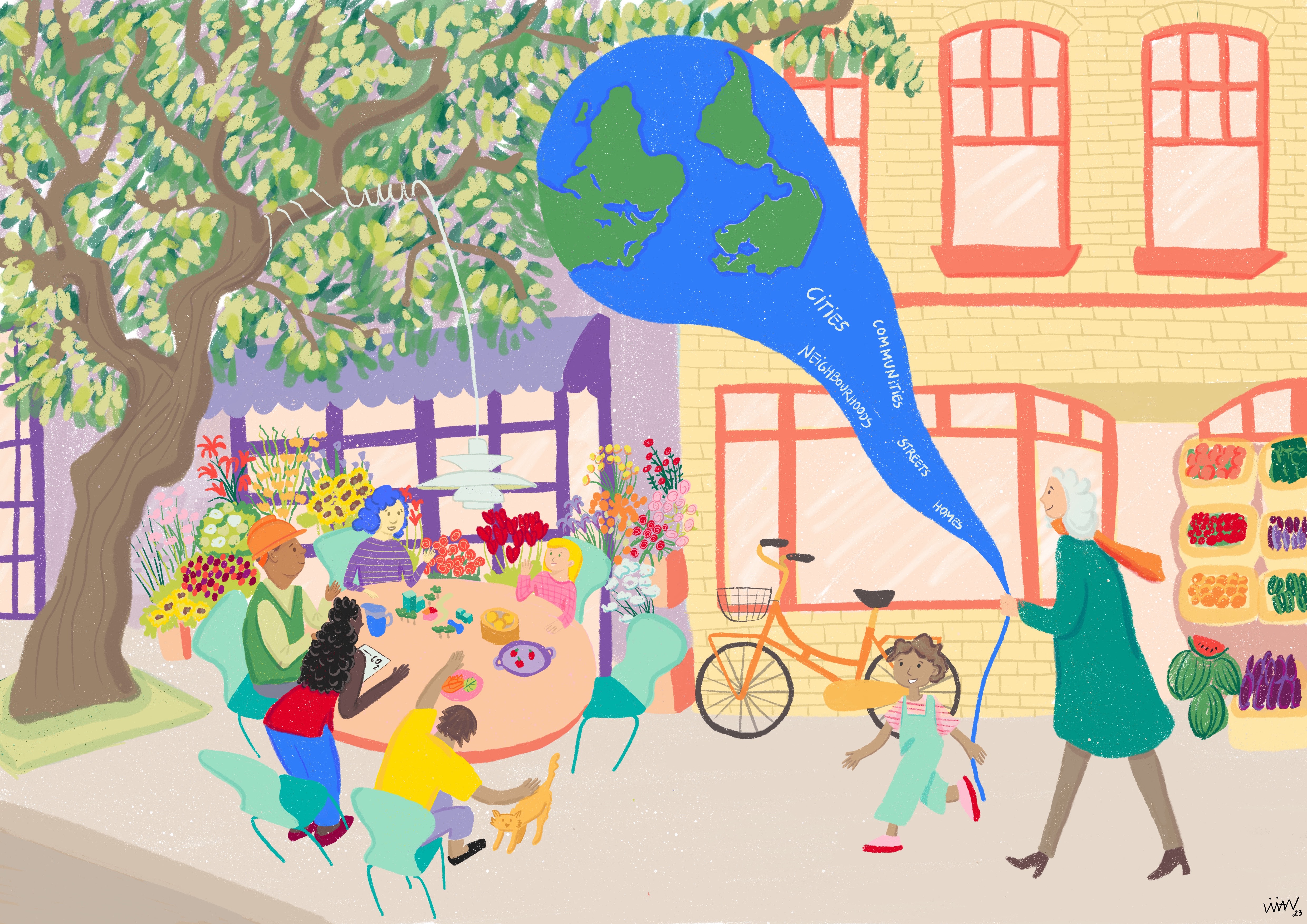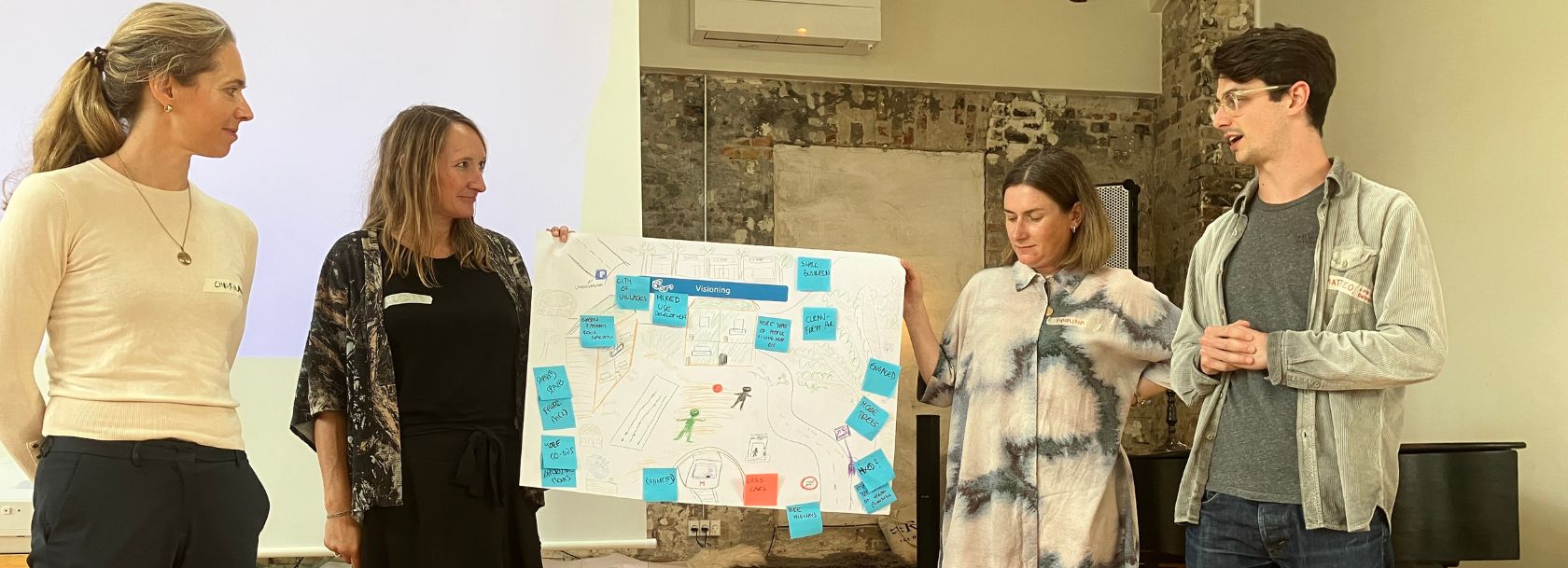On 12 September 2023, as a part of the 'Building for Today and the Future' project, stakeholders across different sectors gathered at Demokrati Garage in Copenhagen. The workshop, organised by IHRB & Rambøll Management, aimed to create a shared vision for socially inclusive climate action in Copenhagen's built environment.
The project combines research and visioning in eight cities worldwide, linking to regional and global advocacy to ensure that climate action regarding buildings and infrastructure is just and respects human rights. It focuses on four key areas: affordable housing; the rights of construction workers; meaningful participation; and non-discrimination and spatial justice.
Key Insights from the Visioning Session
-
Macro-Sharing and Regional Integration: A broader perspective is essential, looking beyond the city centre to the suburbs. The idea is to balance resources between city centres and suburbs, preventing atomisation and sub-optimisation. Using infrastructure as a proxy for the building and real estate market, the aim is to learn from past challenges and successes.
-
Governance and Inclusion: The governance structure surrounding urban development needs to be more inclusive, with a critical look at pricing. There's a call for a governance structure that enforces visions, ensuring developer compliance.
-
Housing and Social Justice: Housing is a fundamental human right. The vision emphasises diverse housing options and acknowledges areas that require more assistance. The city should be accessible to everyone, not just the affluent.
-
Relationship Building and Multigenerational Use: The city should optimise space, repurpose existing buildings, and focus on shared living. There's a need for new ownership models and a city that embraces diversity.
Key Challenges and Opportunities
Public Sector Actors
-
Challenges: Overcoming path-dependencies, favouritism, outdated regulations, and atomisation. Addressing tax burdens on potential tenant benefits and legal challenges to new forms of ownership or tenancy. A lack of data and a shared understanding of relevant social indicators is also a significant challenge.
-
Opportunities: Enhancing infrastructure, better incentives, and long-term planning. Promoting equality for migrant workers, incentives for green transition, and reflecting the welfare state in housing to create ‘wellness’ for all. The upcoming Corporate Sustainability Reporting Directive (CSRD) from the EU presents an opportunity to embed social indicators into project implementation.
Private Sector Actors
-
Challenges: Eliminating siloing, favouritism, market rules, and short-sighted decisions. Fostering creativity and respect for nature and people, addressing the lack of diversity in representation, and the absence of socially inclusive financial models.
-
Opportunities: Encouraging collaboration, post-completion accountability, joint vision, and political leadership. Innovating in building materials, fostering more equitable markets, ensuring representation of diverse groups, and providing socially inclusive financial models.
Other Actors (Civil Society, Academia, Media)
-
Challenges: Overcoming ambivalence, focus on wealthy citizens, and lack of empowerment. Developing more methods for social engagement and addressing the lack of insurance.
-
Opportunities: Raising awareness, ensuring equal attention to issues, better funding, and meaningful engagement. Valuing lived experience and understanding sub-local level perspectives of change pathways.
The Copenhagen Visioning Workshop was a pivotal step in creating a roadmap for Copenhagen's built environment, emphasising human rights and promoting a just transition. The insights and discussions from this workshop, coupled with the opportunities arising from new regulations and a focus on greater transparency and inclusivity, will undoubtedly contribute to the broader global initiative, ensuring that our cities are built for today and the future.
How do we make the vision a reality?
Table for workshopping specific barriers and opportunities
Cities of the future: Visions for a just and climate-resilient built environment
We commissioned young artists in Lagos, Lisbon, Jakarta, Prague, Copenhagen and Melbourne to bring the visions of a fairer, greener future for each city to life through visual art pieces that can serve as a unifying vision for a locally-grounded, fairer transitions.
 Vivian Monteiro Malta, Copenhagen, Denmark
Vivian Monteiro Malta, Copenhagen, Denmark



